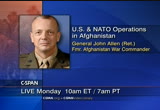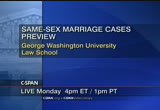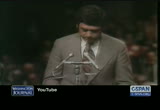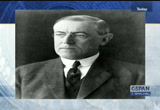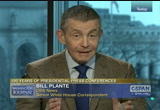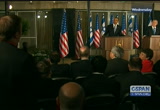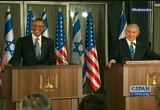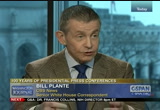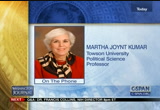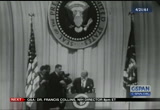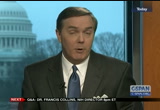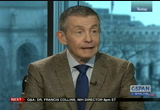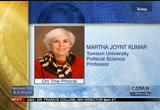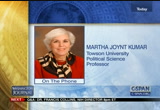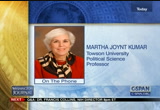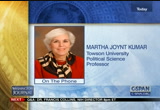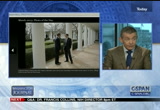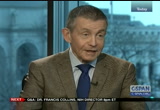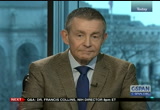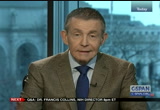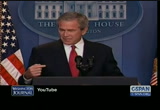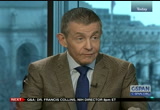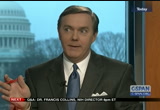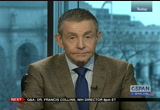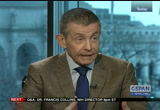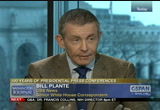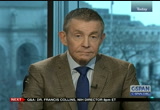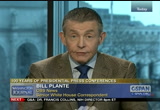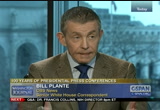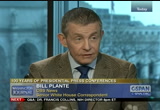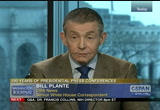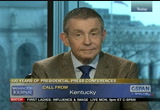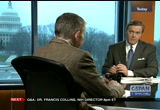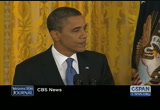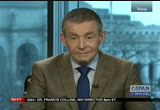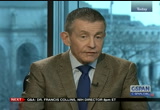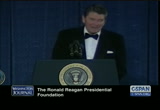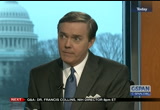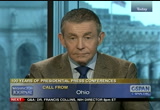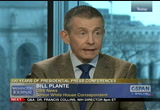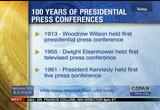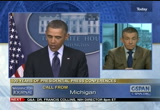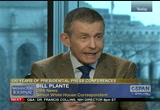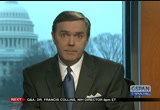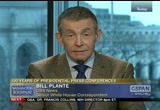tv Public Affairs CSPAN March 24, 2013 7:15pm-8:00pm EDT
7:15 pm
7:16 pm
7:17 pm
>> how have these news conferences and press conferences began over the years? >> the news conferences began as a group of reporters in an almost accidental way. wilson thought he was sort are meeting the reporters one by one. when there were 100 of them or more pushed into the oval office, he addressed them. then there were more that could not make it that day. so a week later, he did the same thing in the east room, and they asked questions. that became the forum. for the first, i don't know, 60 years or so, there was a
7:18 pm
back-and-forth, but it was understood that it was off the record. unless the president allowed the quote. and truman and eisenhower altered quouts quotes if they didn't like what they said. it has erolved in different ways. >> what makes a good question. what are you looking for and how do you frame a good question? if you frame a question so that it comes in several parts,ed president can always answer one part but not another. in any case, any president has learned to answer what he wants to answer rather than the question asked.
7:19 pm
you try to answer a question straight forward that does not have a possibility of going off in another direction. >> just this past weekend, chuck todd with a series of questions to president obama, as the president continued his trip through the middle east and was joined by the israeli prime minister benjamin netanyahu. >> thank you, mr. president. mr. president, i want to follow up a little on the peace process. you began your first term, big fanfare, cairo speech to talk to the muslim world, the decision to have a middle east envoy early. you weren't going to let this slip to your second term, the second term with the mideast peace process. what went wrong? why are we further away from a two-state solution. i know you said you want to talk more about this tomorrow, but what do you believe went wrong? did you push israel too hard?
7:20 pm
what do you wish you would have done differently? and mr. prime minister, i want to help out my colleague here, with a follow-up, do you accept the president's understanding that iran is a year away when it comes to nuclear weapons. another question i have for you -- >> you are like the israeli press. you say you have one question, and then -- the lady from channel 1 said she had one question, and then -- >> these are muted questions, reity -- reiterations. >> look, this is not a kosher question, but don't hog it. >> this is zactsly the kind of pitfall i was talking about earlier. trying to do a follow-up on an
7:21 pm
answer that had come before that was at best inconclusive. and then he had a question of his own. but then he also had a question for the prime minister. see what happens? it allows the two principals -- principle -- in that case to can change the sunt. -- subject. chuck is a good friend, but he should have probably stuck to one question each. and let me just say, that set-up where they have a president and a foreign leader. in this case our president was the guest, but those kinds of news conferences don't produce very much because there are usually only two questions per side. so you don't get a wide-range of exchange. >> and you also have translations. >> and you also have translations, which close everything down. >> a person inside the white
7:22 pm
house briefing room. she has written a book titled the messaging of the president, the white house commune cages operation. these she's also a professor at towson university. thank you for being with us. >> thank you. good to see you both. >> let's talk about how all of this evolved. as bill plante pointed out, the first conference was an inauspicious owe indication. >> it certainly did. the following week, woodrow wilson had people come into the news room where he talk bd what this relationship was going to be with reporters, how he needed them. he wanted them to work in partnership with them.
7:23 pm
he said it would be off the record, and it would also be a transsubscribed session. so it was going to be a formal statement by him of his policies. so we have that transcript from that point forward. >> how did live, televised coverage of these news conferences, which began under president kennedy, change these events? >> it changed everything. first of all, it was a great novelty. kennedy was very good. he was adept at being clever about the questions, making the reporters laugh. and everybody loved it. as martha can tell you, calvin coolidge had -- how many was it?
7:24 pm
>> he had 530. >> talked to the president 531 times in four years. >> 521. excuse me. how many times has president obama had a solo news conference ? 29. that's a solo news conference. the white house will come back and say well he's had several hundred media appearances. meaning he has sat down with an individual reporter or that he has appeared with a foreign leader, or he's answered questions in the oval office. we're talking about news conferences closely depee fined. -- defined.
7:25 pm
>> president reagan had news conferences in order to reach to the press and the public. because it was a pretty good bet in those days that a significant amount of the evening viewing audience would have to watch the news conference because it was carried on all three networks. we're going to go over your
7:26 pm
heads. we're going to reach the public directly. it is much easier to do now than it was then. back then before cable and before social media, we and the newspapers and the wire services set the agenda. we no longer do. >> how is this changing the way this white house and future white house's send their message? >> they are concerned with it. the social media was very important for their election. they have been able to har net that engine that they used in the campaign and make it work for them and governing.
7:27 pm
when they made their press transscripts available on the record, the press secretary james haggard was very interested in getting things out directly. he said in one of his diary entries, to hell with reporters, we'll go directly to the people. those have to do with what the president is doing inside the white house, and then that information spreads. so you can have smgs like "the
7:28 pm
7:29 pm
>> the white house issues a photograph of the president in any setting, but it is only a society photo. are news organizations becoming reluctant to use that photo? >> it is really quite the opposite. they have started picking up that image on flicker. what you see is the white house photographer is there to photograph the president, not the presidency, not what's happening in the white house, but solely the president. and i think that that really limits what the public knows. >> martha joynt kumar, the author of "managing the president's message, the white house communications operation."
7:30 pm
thank you for sharing your insight with us and pointing out the 100th anniversary of the presidential news conference. thank you for your time. >> thank you, guys. >> well, look, as the memming was said, when the white house puts out a program, they have chosen. it is used to flatter the president or show him in a positive light. as long as we don't have the same access, it is sort of state media. i mean, look, they can put out their own material. the first amendment applies to them as it does to us and everybody in this country. if they deny us access and then put out their material, that's different. >> what you saw yesterday is a
7:31 pm
collaborative effort of giving information to the white house press corps, and yesterday the report pointing out that the president came back in the cabin on air force 1 as he returned from the middle east. that is a rare owe indication, isn't it? >> it is. it doesn't happen very often. when it does, it is considered off the record. what that means is, you can't really report anything that the president said. you can report the fact that he quame back and -- came back and talked to reporters. they will pass on the substance of the president's remarks to the rest of the press corps in a limited way. eventually it all leaks out anyway. that's another story. >> we have a former reporter who is now a white house press secretary. does that help or hinder his job as press secretary to president obama?
7:32 pm
>> well, he serves the president first before he serves the press. that's what you have to bear in mind. he knows how it works, he knows how we think. he's been in our shoes following other presidents. that is helpful to him and the white house. maybe not quite as helpful to us. >> barbara joining us from portland, oregon, we're with cbs' bill plante. good morning.
7:33 pm
>> did you think that reflected well on the president? >> i don't think the press corps hates the president at all. i think there is antagonism toward the white house in general, not toward the president in particular. we are always trying to get information they don't want us to have. remember, we are not there to be a mouthpiece for any administration. we're not on the team. that's really the important point. we're there to try, to the best of our ability, to get information out to you. now, look, if you happen to like this president, then we're probably not doing our job in your view. if you don't like the president, we're still not doing our job, because we're not tough enough. and as far as chuck's performance, it devolves into what we do these days. we try to get the most opportunity to ask questions. in that setting, it didn't work, because he got tripped up by the two people he was questioning. >> our area code is 202 here in
7:34 pm
7:35 pm
and say thanks. thanks for such a solid, sound question. i'm going to cut the ribbon. then you yell. i cogutate, and then smile and wave. [laughter] >> bill plante. >> he had a very playful moment there. but he's getting at something that is very true. everybody tries to get recognized. "mr. president! mr. president! what about -- what about" he can choose not to answer. it really is in his hands. now, that used to be the norm for news conferences. but somewhere around the reagan era, maybe with prime time coverage, it got very zade -- zate -- sedate.
7:36 pm
people waited to be called on. now people have a solo seating chart in front of them, and probably, at least in this case, a list of reporters on whom he's going to call. so it is hard to get recognized. president reagan once at the end of a news conference recognized sara mcclendan. a woman that did not take "no" for an answer. he called on her at the very end and said, i'll take one from you. she said, folks there are people down there at that army depot in texas robbing the government blind. what are you going to do about it? he looked at her and said, sara, i'm going to have the boys look into it.
7:37 pm
>> he always wanted to answer the question. he thought he had a good question or one-liner. staff did not want him to do that. so they moved him further away, and he was hard of hearing. every once in a while he'd walk out and we'd be yelling questions "mr. president, mr. president." he'd turn his head and say, "well, they haven't told me yet." then he'd grin and walk out. >> democrats line. >> good morning to you. i'm wondering about bradley manning today. we have on the facebook, we see this picture all the time now of president bush, like you just showed, next to bradley manning. the question is bradley manning is forgotten and locked up
7:38 pm
somewhere, whereas bush who started the war is walking around free. what is the press doing about that? >> well, the press is covering the trial of bradley manning. and you are right. bradley manning remains in custody. the trial is under way, and the trial is getting a lot of press coverage. >> when you first started covering the white house in the reagan era, cbs news and the evening news dominated where people got their news and information. we were talking earlier about social media. it changed over the years. has it changed the way you do your job? >> i don't think so. we still try to cover the news on a daily basis for both morning and evening news cycles. we doo, however -- we do, however, make use of social news media. it has changed it in that respect. we don't hold back anymore. in those days, 1981, when i started covering the white house, we saved our best material for the evening news. we can't do that anymore, because we have lots of competition out there on cable
7:39 pm
and on the net. so now, whatever we get goes out right away. >> i had to ask you about -- you are sitting next to mark moler. any time the -- they want information hon how many times they want to know how often the president has been to camp david, they go to mark muler. >> mark muller who has covered the white house since the ford administration decided at the beginning of the clim clinton administration that he needed to keep track of statistics about the president's movements and the number of times he played golf, the number of fund raisers he's had, how much money he'd raised. just about anything you can imagine. he does this by studying the logs every day. he remains there sometimes until 8:00 or 9:00 at night. he has the most complete records
7:40 pm
that exist. if the white house has a question about some number, they will go and see what his number is. he is very meticulous, and we all are very thankful that there is a source like mark muller. >> mike is joining us. >> good morning. thank you for taking my call. >> go ahead. caller: how much information becomes confused as news? i would like to hear your opinion about fox news. it is parent to most independent and open-minded people that not only are there stories -- their stories skewed so far to the right, the talking points, every issue is turned into a scandal, is turned into more reasons to
7:41 pm
disrespect the president. i appreciate the media challenging the white house on everything. but i'd like to get your opinion on where you think fox news is leading the media, and also address how the rest of the media seems to defend them from time to time. jake capa refers to them as a sister news network. you will never hear that talk on fox. you hear mainstream news network. i'd love to hear your opinion as your experienced journalism over the years how you feel it has changed. host: thank you, mike. guest: i think they do it in their talk shows for a reason. they do it because there is an audience they want to capture. it is not an accident they found a initiative they thought was -- a niche that they thought was under served and went after it.
7:42 pm
there is no question the right wing point of view is favored in their talk shows. you will see on the other side of the coin that msnbc does much the same thing on the left. they do it by design because they are after an audience. it really is sort of at bottom a commercial decision. host: there was a comment by marlan fits water -- fitzwater. he was asked about the number of press conferences that reagan had, and he pointed out, look where that got him. saying that the number of news conferences does not necessarily help the president. guest: i think that is the preveiling view in most white houses. if you put the president up there, taking questions by himself, you never know exactly what's coming. and the potential for moving it
7:43 pm
up a bit is always there. so they don't like thafment they can't control it. so the number of approvals from administration to administration, the last two administrations have held very few solo news conferences. the reason is, it is an uncontrolled situation. even though they do practice. the most common question that they get, that i have gotten from people, is do you submit your questions in advance. the answer is, absolutely not. but the white house staff can generally figure out what questions we are going to ask. because we were ask the questions that are on the news topics of the day about any lingering scandals or investigates. it is all pretty easy. >> i will ask you about your most memorable moment. if you covered public or private, you can mention that. we want to welcome our audience.
7:44 pm
we are focusing on 100 years of presidential news conferences beginning informally back in 1913, whether presidential woodrowe wilson was in the white house. good morning, paul. caller: respectfully miss the point. i think your answer on fox is disingenuous. their regular reporting is skewed. do you think it helps when this administration invites in reporters from across the country to do interviews? do you look upon that with disdain? guest: i don't disdain it at all. it is helpful to local reporters and their stations. it is not at all helpful to the process of newscasting that we do. it is another way for the white house to get the president out there, to have him seen by a lot of people, particularly in key markets.
7:45 pm
if you looks at the statements, you -- if you look at the statements, it will be in key districts where they are trying to get the member of congress to say something, to vote a certain way. it is all very carefully planned. i don't think it gives those local reporters a chaps to ask questions that are of interest mainly to their own audience. i don't think the white house should crow about how much media experience or exposure the rpt has give -- given, when it goes not so much to the rest of it. host: caller from michigan. caller: i'm wondering what happens in an off-the-record conversation? what does it mean historically or now? host: good question. thank you. guest: an "off the record
7:46 pm
discussion" in this town is one in which you can chat informally with the president or member of congress and you can use what you have learned to inform your own reporting. but you can't quote him. in other words, it never happened, except you know more at the end. it saves the person you who are interviewing, who is being off the record, from any possible embarrassment or blowback or from anyone being able to say, but you said then, or your unvarnished opinion of x is so and so. it is completely protected. we like to insist that things be on the record. sometimes sources won't allow it, so you take what you can get. >> have you counted the number of countries you have gone to since covering reagan? >> roughly, about 120. that leaves about 70 or 80 to
7:47 pm
go. host: here is one of your questions on the affordable care act. bill plante. >> bill plante. >> anyone on capitol hill will say that there is no chance this jobs act passes either house. you go down to the campaign trail banging away at them saying, pass this bill, and it begins to look like you are campaigning and you are following the hairy truman model against the do-nothing congress instead of negotiating. are you negotiating? >> i am in negotiations, and what is also true, is they need to do something. the question is, will congress do something? if congress does something, then i can't run against a do-nothing congress. if congress does nothing, it is not a matter of me running against them, i think the american people will run them out of town.
7:48 pm
host: did he answer your question? guest: no. he turned it around. the question really was is there any point in continuing to talk about the american jobs act if it isn't going to pass, which everybody agrees it wouldn't. it could have been more artfully act asked, i suppose. he turned it around and made the same argument he's making on the trail saying, if they would do something, then it could pass. host: let's go to charlotte in indiana. caller: my question for bill is does does he think the president's white house is more transparent than the past presidencies or is as transparent as he campaigned that it would be? host: i guess the other part of that question is, how do you measure transparancy? guest: i am glad you brought
7:49 pm
that up. they came into office, this white house, saying we are going to be the most transparent white house ever. they are not any more transparent than any other white house, because it doesn't suit them to be. they will cite all kinds of statistics that show how many interviews and so forth, but as we discussed earlier, it is really not the point. it is about making the decision-making processes, about explaining the process of making decisions, which they don't particularly do very well, because it doesn't serve their own interest to do it. i understand why, but the claim of transparancy is not credible. host: in covering five presidents, you are your most memorable moment public or private. guest: i would have to say privately it is off the record in general with presidents reagan, bush 43, and obama.
7:50 pm
there is no denying that the opportunity to talk informally to a president is a very special thing. and you come away having learned something about the person or about his policies. publicly i have made a spectacle of myself so many times, it is hard to say. host: in april of 1988, president ronald reagan. >> george bush is doing well. george has been a wonderful vice president, but nobody is perfect. i put him in charge of anti-terrorism and the mcglove lynn -- and the mcgloughlin group is still on the air. [laughter] >> but with some -- so much focus on the presidential election, i've been feeling a little lonely these days. i'm so desperate for attention,
7:51 pm
i am considered holding a news conference. host: was there a private ronald reagan? was he different off camera than on the stage? >> he really wasn't. when you talked to ronald reagan in private, you got sort of the same stories about life in hollywood or california and politics that you often got in public. he was, in fact, a very private man. he was always cordial, always pleasant. host: did he enjoy these conferences? guest: i don't think he particularly did. host: did he look at the history -- if you look at the history, was your sense john kennedy enjoyed these conferences? guest: i believe he did. host: let's go to alex in
7:52 pm
youngstown, ohio. caller: what is his relationship -- [indiscernable] i'm reminded that world war i that wilson got the u.s. involved in is the first war in which mass mobile zation of the public was -- mobilization of the public was manipulated by propaganda. he says "the conscious manipulation of the organized habits of opinions of the masses is an important element. to manipulate this unseen portion of society is the true
7:53 pm
ruling power of our country." i'm curious what your guest from towson university said. you are not getting more information from the public, you are manipulating the public more. host: thank you for the call. let's go back to her earlier point about how this all came about. because you are talking about the first news conference in 1913. as we said earlier, it was an inauspicious occasion for president wilson. he was asked a question from the new york evening post and he responded that the president replied crisply, politely, and with the fewest possible words. guest: well, look, it is true about trying to manipulate the public. all presidents are trying to do this. it depends on your view of the public, if you think the public can be manipulated like a lump of clay.
7:54 pm
edwin l. bernaise wrote those words 100 years ago when perhaps society and academia believed that the public was easy to manipulate. it is no longer true, i don't think, if it ever was, because there are too many sources of information. there is no one source. if all you have is state-run media, let's say north korea, then you are either going to believe or not believe everything you hear, and you get no alternative view point. in this country, certainly in modern times, there has been a plethora of voices. and you don't have to rely on any one of them, and that's a good thing. host: these press conferences began with wilson 100 years ago. they began taped. the first live press conferences began in 1951 with dwight
7:55 pm
eisenhower. we continue with jim. caller: any time i hear obama speak, first of all, i can't believe half the words he says, but the news media doesn't challenge him on anything. the first thing he does is blame the republican party "they are not working with me, they are not doing this." but we all know the democrats are doing the same thing. they are telling people lies, not telling the truth. obama, his incompetence as a president, he blames -- this is why i'm not getting things done. he's supposed to be a leader of the people. the news media let's everything go, doesn't -- you know, obama is doing a great job and everything else. the american public knows it is not true. host: jim, thank you for the
7:56 pm
call. is that tactic different from president obama, president reagan, or president bush? guest: no. all presidents do that. the one point i totally agree with is that the press generally let's presidents say what they want to say and then challenges it in a different way. i mean, you get use today a president's normal line. this president blames the republicans, that's true. ok. so what? he blames the republicans. the republicans in fact are in one house of congress, and they are not letting him get anything done. that's true. he plames them. who is listening? he hopes the public is. it doesn't necessarily resonate with the press on a day-to-day basis. host: this is only anecdotal, but often in a news conference is more news made in the second half after the president has followed up on his talking
7:57 pm
points, and all pts have them rvings and the expected questions, but often there are the unexpected questions. guest: that's right. the example that comes to mind is my colleague john dickerson asking president bush 43 if there was a moment that he wished he could live over or his worst moment. and bush had to think about it. too bad we don't have the clip. he stopped. he thought. he said i wish you would have given me that question in fans, so we could have thought about it. those unthought-out questions sometimes produce the best answers. host: richard from indiana. caller: he just entered his second term, and all presidents have a number of people they
7:58 pm
reward, their contribute tores -- contributors to presidential appointment positions. i've been in the government a while, and i have seen a lot of them that come in -- it is a little embarrassing. if you are trying to save some money, you have already got those government employees all over the different departments, but when they reserve them for presidential appointees, it those -- shows a lot of incompetence. can you comment on that? guest: sure. what you are saying is basically true, but presidential appointees are often big contributors, and they want to be rewarded. presidents reward them sometimes with cabinet jobs. they are not always incompetent. sometimes not well versed. the career bureaucracy tends to run it. this is a given of modern government.
7:59 pm
host: they ask you about stories that appear a day before they are announced. the -- explain the process for nid administration to get those stories out on their own terms. guest: when the administration has to make an appointment, they will often leak the story either to the associated press with an embargo of,, -- say, the next morning at 6:00 a.m., or to a major newspaper, "the new york times," for example, and they will do it often with a print medium before they do broadcast because that way they can get more of the substance out there. and this is a standard practice. we have all come to accept it. they do it
97 Views
IN COLLECTIONS
CSPAN Television Archive
Television Archive  Television Archive News Search Service
Television Archive News Search Service 
Uploaded by TV Archive on

 Live Music Archive
Live Music Archive Librivox Free Audio
Librivox Free Audio Metropolitan Museum
Metropolitan Museum Cleveland Museum of Art
Cleveland Museum of Art Internet Arcade
Internet Arcade Console Living Room
Console Living Room Books to Borrow
Books to Borrow Open Library
Open Library TV News
TV News Understanding 9/11
Understanding 9/11